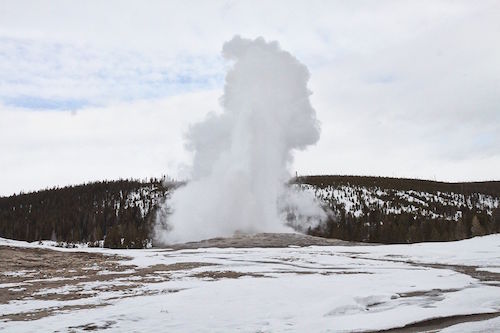 Culture & Ethics
Culture & Ethics
 Faith & Science
Faith & Science
Pope to Declare that Nature Has Rights?

Commonweal, as I understand it, is a liberal Catholic publication. As Roman Catholics prepare to hear Pope Francis’s statement on global warming, writer Robin Darling Young seems to hope that that he has something far more transformative in mind than urging a reduction of our carbon dioxide footprint.
From “Does the Earth Have Rights?”:
But he may go further now, and address our duty to other species and to the integrity of a creation that is losing many of those species. He may end up moving beyond traditional calls for good stewardship by acknowledging, at least implicitly, that nature itself has rights — rights that are being flagrantly violated by human beings.
“We have, in a sense, lorded it over nature, over Sister Earth, over Mother Earth,” Pope Francis remarked to journalists recently. Was he really implying that created nature — the environment — has rights of its own? Such a view on the part of the pope would be a significant development in Catholic thinking about the inherent worth of creation apart from the humans who dominate it. We shall soon find out if he meant it.
Such a view would create a schism in the Catholic Church. Moreover, in the event of such a sorry circumstance, I think it should.
I am not a Catholic, but I do know that Catholicism focuses with extreme concentration on the unique dignity and value of man. Declaring the rights of nature would be profoundly subversive of that dogma. Erasing the crucial distinction between humans and other species — not to mention the inanimate and inorganic aspects of nature — would diminish us, turning man into just another animal in the forest.
“Nature rights” would cause unquantifiable harm to human thriving. If nature possesses rights — which would mean viruses, granite, wind, as well as sentient and insentient species — it (they) must be given equal consideration with human benefit in everything we do. Can you imagine the disruption to our economies?
And who would be the enforcers of nature’s putative rights? Misanthropic environmentalists and neo-earth worshippers who consider man a vermin species, a cancer on the planet — or, as the radical David Suzuki once put it — akin to maggots. But if nature has rights, maggots become our quasi-equals. No?
“Nature rights” would likely increase oppression. If we are akin to nature, why should our care and concern for human beings be any greater than for a swamp, mosquitoes, or weeds? Very destructive forces would be unleashed by the logic of elevating nature into a rights-bearing entity, and humans would become the primary victims.
If “nature” has “rights,” infinite duties will be imposed upon us — “infinite” because we can’t conceive of all the manifestations and permeations a regime of nature rights would take — but “nature” would owe none toward us.
Besides: Why do we have duties toward the natural world? Because of human exceptionalism!
We are the only moral agents in the known universe. Imposing unique responsibilities to all of creation (for wont of a better term) — without accepting our own unique value — would create a massive intellectual and moral imbalance, shattering our understanding of the inextricable mutuality between rights and duties. The very concept of rights would wither.
And it is so unnecessary. Robust environmental protection does not require the fiction of “nature rights.” I mean, look at Yellowstone. It is very well preserved and protected and we didn’t give Old Faithful geyser rights.
I have written more extensively on this elsewhere, including my e-book The War on Humans. If everything has “rights,” nothing does. Declaring the rights of nature would be akin to printing currency in a context of wild inflation: Ultimately it becomes worthless.
Image: Old Faithful, by Debeo Morium (Own work) [CC BY-SA 3.0], via Wikimedia Commons.
